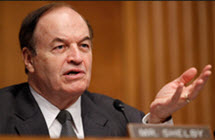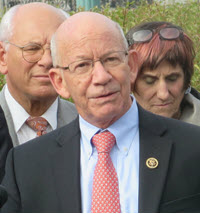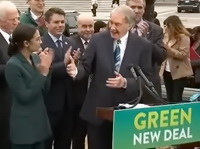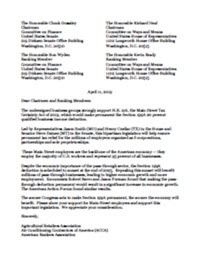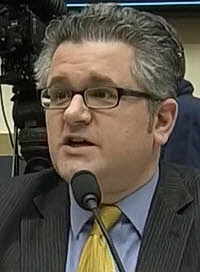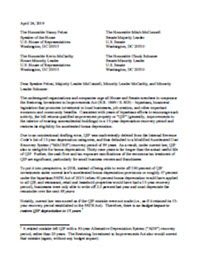Speaker of the House of Representatives Nancy Pelosi (D-CA) and Sen. Tim Scott (R-SC) were among the guests who addressed national policy issues during The Real Estate Roundtable’s 2019 State of the Industry (SOI) meeting this week in Washington.
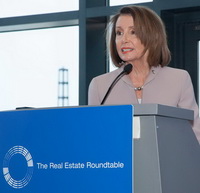 |
|
Speaker of the House Nancy Pelosi (D-CA) addressed the Democrats’ legislative priorities in the 116th Congress. |
- Roundtable Chair Debra Cafaro (Chairman and CEO, Ventas, Inc.) launched the meeting on Tuesday, noting that 2019 marks the 20th anniversary of The Real Estate Roundtable’s advocacy efforts in Washington. She also announced the release of The Roundtable’s 2019 Policy Agenda – developed with input from a recent membership survey; discussions held throughout the year by policy advisory committees; consultation with 17 national real estate trade association partners; and The Roundtable’s Board of Directors.
- Roundtable President and CEO Jeffrey DeBoer discussed policy initiatives the organization will focus on with the new Congress and the Trump Administration. The issues include ongoing implementation of the 2017 tax overhaul; FIRPTA repeal; infrastructure; affordable housing; renewal of the Terrorism Risk Insurance Act (TRIA); and energy efficiency initiatives affecting commercial real estate – all vital to spurring job creation and sustaining economic growth.
Policy Issues & Featured Speakers
The SOI meeting included the following speakers:
 |
|
Speaker Pelosi, Roundtable President and CEO Jeffrey DeBoer, and Roundtable Chair Debra Cafaro (Chairman and CEO, Ventas, Inc.) |
- Speaker of the House Nancy Pelosi addressed the Democrats’ legislative priorities in the 116th Congress, including infrastructure improvements; the low-income and workforce housing crisis; and policies that will continue to foster economic growth. She emphasized the need for lawmakers to find common ground for the good of the nation, despite their differences on policy.
- Sen. Tim Scott, a leader in the development of legislation that established the new Opportunity Zones program, discussed the OZ program with Roundtable Member Geordy Johnson (CEO, Johnson Development). Sen. Scott delved into the creation and ongoing development of the OZ program – designed to channel investment and spur economic development, affordable housing, and job creation in distressed areas throughout the US. He also offered his views on how members in both the Senate and House need to inspire civility, opportunity and fairness in public life and the private sector.
- Dr. Ken Rosen , chairman of the Rosen Consulting Group, offered a presentation on “Continued Recovery or Brink of Recession.” Joining Dr. Rosen in a discussion about recent Fed actions, stock market volatility and how signs of weakness in the Chinese economy may affect U.S. growth, were Roundtable Board Members Ric Clark (Senor Managing Partner & Chairman, Brookfield Property Group); Thomas Arnold, Global Head of Real Estate, Abu Dhabi Investment Authority); and Roundtable Chair Debra Cafaro (Chairman and CEO, Ventas, Inc.).
- Jim VandeHei , co-founder and CEO of Axios – a media company delivering news and insights on politics, business, media and tech – discussed the confluence of recent elections, social media and emerging global influences such as Artificial Intelligence.
- Jeff Flake (former US Senator, 2013-2018) and Joseph Crowley(former Member of the House, 1999-2018) discussed prospects for policymaking in a divided Congress with Roundtable President and CEO Jeffrey DeBoer.
 |
|
Sen. Tim Scott (R-SC), left, a leader in the development of legislation that established the new Opportunity Zones program, discussed the OZ program with Roundtable Member Geordy Johnson (CEO, Johnson Development). |
Roundtable Policy Committees
SOI also included meetings of The Roundtable’s policy advisory committees, which analyzed policy issues with high-level congressional and agency staff
 |
|
Rep. French Hill (R-AR) at the joint Research and Real Estate Capital Policy Advisory Committee (RECPAC) meeting. |
- Research and Real Estate Capital Policy Advisory Committee (RECPAC)
During this joint meeting, Rep. French Hill (R-AR) – member of the influential House Committee on Financial Services – discussed recent, positive reforms to the High Volatility Commercial Real Estate Loans (HVCRE) rules, which he played a key role advancing in Congress. Other issues discussed with Rep. Hill included reform of the Government Sponsored Enterprises and reauthorization of the National Flood Insurance Program, Export-Import Bank and terrorism risk insurance. A panel of industry experts also addressed the current real estate market cycle and the state of real estate capital and debt markets. - Tax Policy Advisory Committee (TPAC)
A panel of all four chief tax counsels from the congressional tax-writing committees described what lay ahead for tax legislative priorities affecting commercial real estate. The discussion, moderated by Russ Sullivan (Brownstein Hyatt Farber Schreck), included Andrew Grossman, Chief Tax Counsel, House Ways & Means Majority; Tiffany Smith, Chief Tax Counsel, Senate Finance Minority; Randy Gartin, Chief Tax Counsel, House Ways & Means Minority; and Mark Warren, Chief Tax Counsel, Senate Finance Majority. An additional panel addressed the evolving Opportunity Zones program and featured Shafron (Shay) Hawkins, Legislative Assistant for Sen. Tim Scott (R-SC).
- Sustainability Policy Advisory Committee (SPAC)
U.S. Energy Information Administration speakers updated SPAC on the Commercial Building Energy Consumption Survey (CBECS) and its impact on ENERGY STAR scores. Additionally, Curtis Ravenel, Bloomberg LP’s Global Head of Sustainable Finance and Business, addressed environmental, social and governance (ESG) risks and opportunities. - Homeland Security Task Force meeting (HSTF) and Risk Management Working Group (RMWG)
Representatives of the FBI briefed the Joint Meeting on the current threat picture and discussed the recent efforts of its Critical Incident Response Group (CIRG) Special Events/Crisis Management Unit. The Task Force was also briefed on that status of reauthorization of the National Flood Insurance Program and the Terrorism Risk Insurance Act (TRIA), a major policy focus of The Roundtable in 2019.
 |
|
Roundtable Senior Vice President & Counsel Ryan McCormick, left, with the four chief tax counsels of the congressional tax-writing committees at the Jan. 30 TPAC meeting. |
Next on The Roundtable’s FY2019 meeting calendar is the Spring Meeting on April 9 in Washington, DC. This meeting is restricted to Roundtable-level members only.
